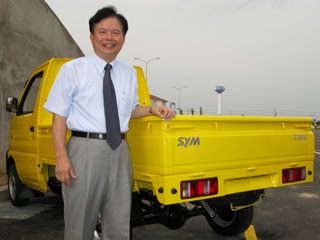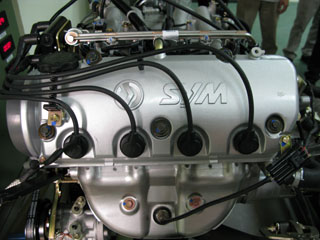Sanyang Bets on Own-brand Auto Production in Vietnam
2008/06/24 | By Quincy LiangTaiwan's Sanyang Industry Co. (SYM), a producer of Hyundai vehicles and the island's second-largest maker of powered two-wheelers, recently announced that its Vietnamese subsidiary, the Sanyang Motor Vietnam Co. (SMV), would introduce its 1,300cc T880 mini commercial pickup in June this year.
The T880, the first automobile to come off SMV's lines, is to be sold in Vietnam under the SYM brand. This makes Sanyang the first Taiwanese automaker to produce own-brand automobiles overseas.
SMV is the first 100% foreign-owned auto manufacturer in Vietnam. It is initially focusing on the production of commercial vehicles under 3.5 tons in size, at an annual capacity of 6,000 to 10,000 units.
Sanyang president Huang Kuang-wuu notes that the Vietnamese auto market is expanding rapidly, making this the right time to establish a foothold there. He is confident that SMV will follow the notable success of another Sanyang investment there, the Vietnam Manufacturing and Export Processing Co. (VMEP), which is now one of the top three PTW makers in Vietnam.

Through VMEP, Sanyang won an auto manufacturing license from the Vietnamese government in 2005. Work on the SMV auto plant began on a 33-hectare plot of land in Dong Nai Province in mid-2006; the first stage of the project, however, is using only 8.26 hectares.
Huang reports that SMV's capitalization of US$20 million is expected to be boosted to US$70 million when the second stage of construction kicks off, and that the company has an in-house auto engine line that makes it eligible for a three-year tax holiday and taxation at half the normal rate from the fourth through 10th years of operation. For its first 12 years the company's income tax will be levied at a rate of only 15%, compared with the general rate of 28%. This will help make the company more cost-competitive, Huang stresses.
Burgeoning Market
New-car sales in Vietnam are just starting to take off. The annual volume of sales there was under 40,000 units up to 2006; then Vietnam joined the World Trade Organization (WTO), and car sales soared to 80,000 units in 2007. Thirty thousand cars were sold in Vietnam in the first quarter of this year, and sales for the entire year are expected to reach 110,000 units.

With the rapid economic development that Vietnam is currently enjoying, Huang comments, the demand for commercial vehicles will be very strong. A total of 4,100 light pickups (under one tons) were sold in Vietnam last year; in that market the T880 will compete head-on with the Suzuki Carry and similar Chinese brands, and will carry a price between that of the Japanese and Chinese models.
Vietnam's Automotive Pioneer
Around 15 years ago, when bicycles were still the major mode of transportation for most Vietnamese, Sanyang chairman Huang Shi-hui decided to set up the first motorcycle plant in that country. The result was VMEP, which today shares most of the market there with Honda and Yamaha of Japan.
Now that Vietnam's per-capita GDP has topped US$1,000 and most Vietnamese have switched from bicycles to motorbikes, Huang decided to set up SMV in preparation for the switch to four-wheelers.
The outlook for Sanyang in Vietnam was not always so rosy. The country was still under embargo when Huang first invested there; and, he recalls, "VMEP suffered continuous losses for nine years. In the 10th year, though, we made more money than we had lost in all of the previous nine years." VMEP has become one of the biggest money-spinners in the Sanyang group, contributing almost 90% of its total profit in the past two or three years thanks to a decline in Taiwan auto sales to 20-year lows.
Huang's "grow with Vietnam" concept, at a time when foreign investors tended to focus on squeezing the most profit possible from the then-poor nation, helped win him the support and respect of the Vietnamese people and government alike.
Sanyang turned out its first automobile, also a mini commercial vehicle that it produced in cooperation with a Japanese partner, in Taiwan 40 years ago. That vehicle carried the brand of the Japanese partner. This time in Vietnam, by contrast, the Vietnamese subsidiary is placing its bets on the development of a true own-brand business.




